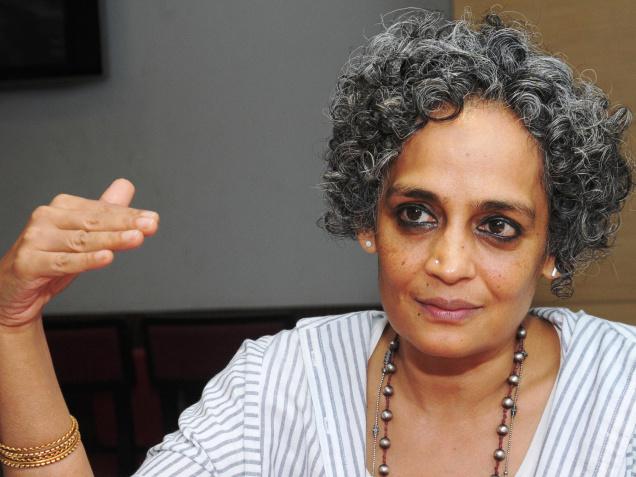(The Hindu) By saying that ‘caste is class,’ the Left has checkmated itself and made itself irrelevant, says writer-activist Arundhati Roy. Photo: K. Pichumani
The writer-activist observes that the Left needs an intellectual re-evaluation of the role played by caste in Indian society.
The fortunes of the Left in India are not going to change dramatically just by effecting a change in its leadership.

Writer Arundhati Roy, who was in Chennai to receive the “Ambedkar Sudar” award conferred by the Viduthalai Chiruthaigal Katchi, was pessimistic about the chances of the Left emerging as a credible opposition to the politics of the Hindu Right, which has sought to combine communal polarisation with corporate-driven economic development.
As the Hindu Right seeks to appropriate B.R. Ambedkar even while pursuing the campaign of ghar wapsi, she observes that the Left needs an intellectual re-evaluation of the role played by caste in Indian society.
“The Left has failed to intellectually deal with the issue of caste. By saying that ‘caste is class,’ the Left — be it in West Bengal or Kerala — has checkmated itself and made itself irrelevant. In this regard, the rift between Dr. Ambedkar and Shripad Amrit Dange, an important member of the Indian trade union movement in the late 1920s, on the issue of mill workers’ rights in Bombay is important. Ambedkar rightly pointed out how there is no equality within the workers where Dalits would only get lower paid jobs. This has been the case since the inception of the Communist party in India,” she claims.
The fight against caste is a complex one, she remarks. “Philosophically speaking, subordinated castes have to take pride in their identity and have to assert that pride to fight caste oppression. But then there comes a tipping point at which that radical positioning is used against itself, in order to promote a kind of isolation, and it suits the privileged to keep that going.”
Not new
She identifies the ghar wapsi campaign by the Hindu Right, which seeks to “take back” the converted Muslims and Christians, as an effort to bring the subordinated castes into the ‘big house but keep them in the servant quarters.’ “The ghar wapsi campaign is not new. It was begun at the turn of the 19th and 20th century by Arya Samaj and the Shuddhi movement to purify the impure and bring converted castes into the Hindu fold.”
It was an ingenious counter-move, she claims, by the Hindu Right to influence the demography as politics of the Empire turned into politics of a representative government. “Until then, nobody cared when subordinated castes embraced Islam, Christianity or Sikhism. Then, suddenly, the demography became important. In this history, which included that of groups like the Arya Samaj — and Gandhi was an heir to that tradition — there was a lot of talk about untouchability, but no talk about caste itself. No talk about entitlement — the access to land, to wealth, to certain kinds of work — that is the real basis of the caste system. Now they have resurrected it because it is not just about Dalit communities as even the Adivasis are being fought over,” she says.
While mainstream commentators have prescribed globalisation and hyper-capitalism as a cure for caste and other inequalities, Ms. Roy warns that the caste structures ‘won’t break down’ by embracing capitalism, but will only be further strengthened.
Toxic alloy
“The fact is that it hasn’t happened significantly. Thomas Piketty in his book Capital in the Twenty-First Century shows how those who have inherited wealth have the best chance of succeeding in the capitalist economy. That makes caste the mother of capitalism because caste is about inherited entitlement supposedly ordained by divine mandate. Caste and capitalism have fused into a toxic alloy. Privatisation will destroy the little foothold that Dalits have in the Establishment because of reservation.”
Ms. Roy slams the new Land Acquisition Bill, tabled by the ruling Bharatiya Janata Party (BJP) in Parliament, dismissing the notion that it will result in more jobs.
“The corporate land grab is the fundamental drive of the new economy. Whether they are IT, coal or steel companies, the first move is to take over and then control land and water resources. The notion that you must allow them to do it and that will generate jobs is a myth. The statistics say that we are only seeing ‘jobless growth.’”
She further adds that the economic and social conditions of 10 million workers in the industrial belt of Delhi, who, she says, are “show windows for the new economy” belie the notion that corporate-driven industrialisation will result in improving the quality of life of the workers. “They live in abject poverty and in absolute terror of their employers as well as their landlords.”
She rues the fact that the debates around land, when compared to the 60s and the 70s, are not “radical” anymore.
“When the Naxalite movement began and the Jayaprakash Narayan-led agitations occurred, a critique of Indira Gandhi was in full flow, what were they talking about? They were talking about social justice, redistribution of land, ‘land to the tiller’ and so on. Today, even the most ‘radical’ movements are only demanding that the lands of Adivasi people be left alone.”
http://www.thehindu.com/news/national/arundhati-roy-interview-movements-are-not-radical-anymore/article7171678.ece?utm_source=Vuuklemail&utm_medium=Email&utm_campaign=Newsletter